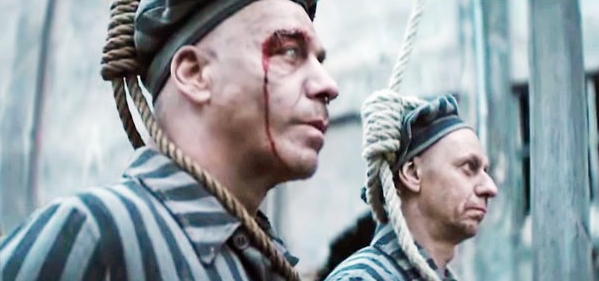
News

Rock band’s concentration-camp imagery generates global outrage
JORDAN MOSHE
Set against a chilling concentration-camp setting, German gothic metal band Rammstein’s recently released hit has sparked controversy across the globe, drawing condemnation from critics as far afield as Israel and South Africa.
What makes this video even more surprising is the group’s guitarist’s Jewish affiliation. Richard Kruspe, who is one of the original three members to form the band, married Jewish South African actress, singer, and producer Caron Bernstein in October 1999.
The ceremony was Jewish-style, and the music for the occasion was composed by Kruspe himself. While he took on the name Richard Kruspe-Bernstein for the duration of his marriage and moved from Berlin to New York to live closer to his wife, they separated in 2004 after being married for five years.
Bernstein – also an activist against rape and sexual assault – was born in Johannesburg and majored in painting at the National School of the Arts. At the age of 14, she was awarded a modelling contract with Ford Models, which took her overseas. She now lives with her new husband and son in New York.
Kruspe’s experience of living with Bernstein and her family clearly did not give him the insight to stop Rammstein from releasing its Deutschland video at the end of March, making it a target of severe criticism, perhaps most notably from the Israeli government.
The spokesperson for Israeli Foreign Minister Emmanuel Nahshon tweeted, “This Rammstein clip, using the Holocaust for advertising purposes, is shameful and uncalled for. We join the many voices calling for its immediate removal.”
Featuring scenes from different points in Germany’s history, the video shows band members dressed as camp prisoners, with one wearing a visible yellow Star of David, a badge used by Nazis to identify Jews between 1939 and 1945. In one scene, several band members are seemingly awaiting execution, shown wearing nooses around their necks. Elsewhere in the video, cast members sporting SS uniforms are seen apparently being shot in the head by prisoners.
This is not the first time the rock band has courted controversy. Formed in Berlin in 1994, Rammstein (which translates as “Ramming Stone”), has for years been recognised for innovation in the music genres of industrial metal and hard rock. Previous songs have dealt with subjects ranging from cannibalism to necrophilia, and even the band’s name itself alludes to the Ramstein air show disaster of 1988 in which 70 people lost their lives and more than 1 000 were injured.
The group previously referenced the Nazi regime in a 1998 video that used clips from the sports film Olympia, a piece of Nazi propaganda directed by filmmaker Leni Riefenstahl.
The resulting backlash resulted in group frontman, Till Lindemann, saying in a 2006 interview that the band would never again dabble with Nazi themes, as he was “fed up with allegations of it being a right-wing band”.
Although the band claimed that it was merely depicting a period in the nation’s history, the video has generated disgust in Germany itself. Felix Klein, Germany’s anti-Semitism commissioner, responded by saying that if the band created the video just to boost sales, it was “a tasteless exploitation of artistic freedom”.
German Jewish voices have also made themselves heard. “With this new video, the band has crossed a line,” said Charlotte Knobloch, the former president of the Central Council of Jews in Germany.
“The instrumentalisation and trivialisation of the Holocaust in the images is irresponsible,” she told German news agency, Bild Daily. “Rammstein is misusing the suffering and murder of millions for entertainment purposes in a frivolous and repulsive way.”
German media also quoted a number of politicians who voiced anger and disgust, with Jewish historian Michael Wolffsohn labelling the offensive video “a new form of desecration of the dead”.
According to Mary Kluk, the director of the Durban Holocaust Centre, the group’s use of Holocaust imagery is not only insensitive, but also has an negative impact on Holocaust education.
She says it is all too easy to forget that there are many people still alive for whom the Holocaust is not history, but the story of their life and that of their families. These are not abstract tragedies on call to provide shock tactics for a controversial rock band. They carry the painful memories of the brutal murder of a cherished baby boy, the abuse of a beloved sister, parents being arrested and never being seen again.
Kluk says that quality Holocaust education has the potential to bridge some of the divides in society, as it enables us to step away from the problems and debates of the present and be challenged by this catastrophic event of the past.
“That engagement is lost when we resort to grossly simplified Holocaust imagery and analogies and demean the memory of the dead. As the Holocaust recedes in time, society is becoming increasingly casual and disrespectful to the mass murder of millions.”
This is not the first such incident in recent history. A year ago, German rappers Farid Bang and Kollegah aroused considerable ire with lyrics boasting of their bodies being “more defined than Auschwitz prisoners”. The ensuing scandal brought about the end of the German music industry’s sales-based Echo prize, which had been awarded to the duo, and sparked rallies calling for solidarity with Jews in Berlin and other cities.
- Bernstein, Kruspe’s ex-wife, did not respond to the SA Jewish Report’s requests for comment.




